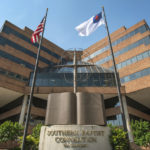NASHVILLE, Tenn.—About one-third of Southern Baptist churchgoers believe more revelations of sexual abuse and misconduct by Protestant ministers remain to be exposed. But few know of specific individuals in their church whose misconduct still is hidden, according to a new LifeWay Research study.
The 2019 Sexual Misconduct and Churchgoers Study by LifeWay Research explored the perceptions and experiences of Southern Baptist and Protestant churchgoers.
“Protecting people from abuse of any kind should be of utmost importance to churches and our convention,” said Brad Waggoner, acting CEO of LifeWay Christian Resources. “LifeWay decided to sponsor this research because it’s imperative we make our churches safe places for people to hear the gospel and grow in their walk with Jesus Christ.”
Undiscovered abuse?
 The study found one in three Southern Baptist churchgoers (32 percent) believe many more Protestant pastors have sexually abused children or teens than have been exposed to date. More (43 percent) disagree, while 25 percent say they don’t know.
The study found one in three Southern Baptist churchgoers (32 percent) believe many more Protestant pastors have sexually abused children or teens than have been exposed to date. More (43 percent) disagree, while 25 percent say they don’t know.
Fewer (29 percent) Southern Baptist churchgoers say there are many more undiscovered instances of Protestant pastors who have sexually assaulted adults, while 46 percent disagree and 25 percent don’t know.
Relatively few say they know someone attending their church who has sexually assaulted someone (3 percent) or sexually abused a child (3 percent), but it has not yet come to light.
“Perceptions are reality,” said Scott McConnell, executive director of LifeWay Research. “When almost a third of churchgoers sense there is an avalanche of abuse and assault cases coming, churches must address this head on even if few say they actually know someone whose abuse is still hidden.”
Prevalence of sexual misconduct
More than a third of Southern Baptist churchgoers (37 percent) say they have been victims of the following types of sexual misconduct—unwanted sexual joking, unsolicited sexual messages, unwanted compliments and inappropriate glances.
Researchers asked those victims where the misconduct took place. Seven percent say the misconduct occurred at church.
Sign up for our weekly edition and get all our headlines in your inbox on Thursdays
Six percent of those Southern Baptists who say unwanted sexual joking was directed at them say it happened at church. The same is true for 7 percent of those who received unwanted compliments that implied the person viewed them sexually, 3 percent of those who received unwanted pictures or sexual advances via text or direct message, and 6 percent of females who experienced prolonged glances or staring at their chest.
When asked if they received compliments that implied the person viewed them sexually, 6 percent of SBC churchgoers say they heard such remarks as a child and 15 percent did as a teenager. When asked from where they knew the person giving the sexually-insinuating comments, 36 percent say school, 34 percent say their home or family and 10 percent say church.
Similar issues continued in adulthood. Southern Baptist churchgoers are more likely to say inappropriate behavior occurred in settings other than the church, but some still reported occurrences in church.
Unwelcome physical greetings?
Some churchgoers expressed wariness over the greetings they receive from others at church. Around one in six (18 percent) say some attendees express physical greetings in ways that seem to go beyond a simple gesture.
A 2018 LifeWay Research study found one in eight Protestant pastors said a church staff member had sexually harassed a member of the congregation at some point in the church’s history. One in six pastors said a staff member had been harassed in a church setting.
Overall, in the 2019 study, most SBC churchgoers (86 percent) say the church is a better environment when it comes to encountering sexually inappropriate comments compared to other places where they socialize with people. That’s slightly better than the 75 percent of all Protestant churchgoers who say the same.
Few Southern Baptist churchgoers (1 percent) believe the church is a worse environment, while 6 percent say it is the same as other places and 7 percent aren’t sure.
“The findings of this study are similar to previous research through the years,” McConnell said. “Churchgoers and the church setting have statistically fewer cases of immoral behavior, but those issues still have a very real presence.”
Prepared to respond?
 Most Southern Baptist churchgoers believe their church is prepared to handle issues of sexual abuse and trust their congregation to respond appropriately if confronted with instances of misconduct.
Most Southern Baptist churchgoers believe their church is prepared to handle issues of sexual abuse and trust their congregation to respond appropriately if confronted with instances of misconduct.
A majority of SBC churchgoers say their church would respond to someone who had experienced sexual abuse, sexual assault or rape with respect (73 percent), sympathy (70 percent), privacy (62 percent) and protection (56 percent).
Few believe their church would ignore the person who shared their experience (2 percent), see them as an attention-seeker (2 percent) or view them as partly to blame (2 percent).
About three-fourths of Southern Baptist churchgoers (76 percent) consider their congregation at least somewhat prepared to help someone who has experienced sexual assault, with 38 percent saying their church is very prepared. Fewer than one in 10 (7 percent) believe their church is unprepared. Eighteen percent aren’t sure.
Is the church a safe place?
The vast majority of SBC churchgoers (95 percent) agree their church is a safe place where adults are actively protected from sexual assault in the church; 3 percent aren’t sure and 1 percent disagree.
More than eight in 10 (86 percent) believe their church is at least somewhat prepared to protect children from sexual abuse in ministry programs, with 62 percent saying their church is very prepared. One in 20 (5 percent) say their church is unprepared and 9 percent are unsure.
Virtually all Southern Baptist churchgoers (96 percent) say their church is a safe place where children and teenagers are protected from sexual abuse. Few aren’t sure (3 percent) or disagree (1 percent).
Southern Baptist churchgoers believe safety measures have improved in the last decade. Around three in four (74 percent) believe their church is more prepared to protect children from sexual abuse than 10 years ago. Few say their church has had no additional preparation (6 percent) or was doing well then and now (7 percent). Thirteen percent say they don’t know.
“Those in the pews are noticing progress in the prevention efforts at their own church,” McConnell said. “Additional steps need to be taken and clearly communicated, however, so that more can say their congregation is very prepared to protect those who attend from sexual assault and child sexual abuse.”
Is the church a place of healing?
If someone did experience sexual abuse, Southern Baptist churchgoers feel confident their church would be a safe place for victims.
 More than nine in 10 (92 percent) say someone who experienced sexual abuse as a child or teenager would find healing at their church; 4 percent disagree. Similarly, 94 percent say their church would be a place of healing for adult victims of sexual assault; 2 percent disagree.
More than nine in 10 (92 percent) say someone who experienced sexual abuse as a child or teenager would find healing at their church; 4 percent disagree. Similarly, 94 percent say their church would be a place of healing for adult victims of sexual assault; 2 percent disagree.
Eight in 10 Southern Baptist churchgoers (80 percent) say an adult attending their church could share that they have experienced sexual assault by a fellow attendee and be believed. Fourteen percent aren’t sure and 6 percent disagree.
“When a church communicates it is a safe place for those who are hurting to find healing, it teaches truths about the identity and worth of every individual,” McConnell said. “More importantly, it answers the fundamental question of whether God cares.”
If sexually inappropriate things happened within the church, 5 percent believe church leaders would try to cover it up. Nine in 10 (90 percent) say their church is likely to report suspicions of abuse or neglect to the appropriate authorities.
Will leaders do the right thing?
Churchgoers also have faith in their leaders to correctly address sexual misconduct that may occur in the church even if it is costly or hurts the congregation’s image. Around eight in 10 (83 percent) agree their church would respond appropriately, regardless of the cost.
If sexual misconduct allegations were made against a pastor, most Southern Baptist churchgoers say they would want a careful investigation of the facts (79 percent), the truth to be made known (66 percent) and the alleged victim protected (54 percent). Four in 10 (40 percent) would want the police involved. Fewer say they would want the pastor protected (17 percent), doubt the validity of the accusation (11 percent) or want the situation dealt with quietly (9 percent).
Most Southern Baptist churchgoers feel safe attending their church. Few current churchgoers say they have ever attended less frequently because of advances from other attendees (2 percent). A similar number of churchgoers say they have ever stopped attending a church because they felt sexual misconduct was not taken seriously (3 percent) or because they didn’t feel safe from sexual misconduct (2 percent).
“Among people who are currently attending church, few said they stopped attending because of issues related to sexual misconduct,” McConnell said. “This does not measure, however, any who left due to these problems and have not returned to any church since.”
The research indicates churches are suffering from negative perceptions with many churchgoers bracing for more pastor-related sexual abuse stories to emerge, McConnell said. That hasn’t worsened churchgoers’ opinions of their own church or caused them to attend less frequently, but they still see areas church leaders should prioritize.
“From the perspective of the pew, there is room for churches to improve their process to prevent sexual abuse and assault, their communication of what is being done, and their handling of investigating accusations,” McConnell said.
The online survey of 1,815 Americans was conducted Feb. 27 to April 8, 2019. Respondents were screened to only include adults whose religious preference is Protestant and who attend church services once a month or more. Southern Baptists were oversampled to provide reliable estimates for this subgroup. Analysts used maximum quotas and slight weights for gender, region, age, ethnicity, education and Southern Baptist affiliation to reflect Protestant churchgoers more accurately, using statistics published by Pew Research.
The completed sample is 1,815 surveys, providing 95 percent confidence that the sampling error does not exceed plus or minus 2.9 percent. Margins of error are higher in sub-groups.













We seek to connect God’s story and God’s people around the world. To learn more about God’s story, click here.
Send comments and feedback to Eric Black, our editor. For comments to be published, please specify “letter to the editor.” Maximum length for publication is 300 words.